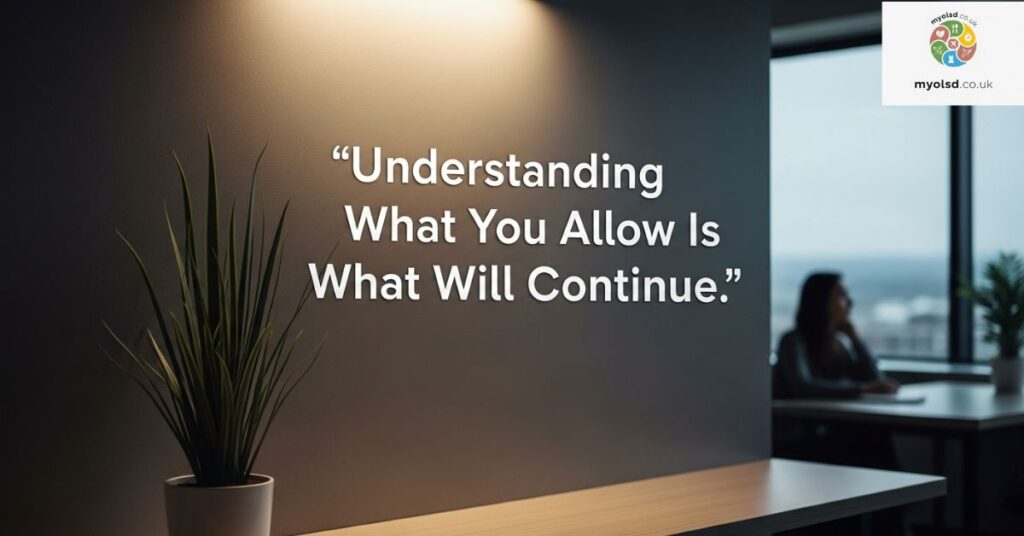Ever feel like no matter what you do, some things in your life just keep happening over and over? Maybe it’s a toxic friendship, a frustrating habit, or situations that leave you drained. You can’t help but wonder why you keep ending up in the same spot, and it’s easy to feel stuck or powerless. That’s where the idea of what you allow is what will continue, really hits home.
In this blog post, we’ll break down exactly what you allow is what will continue means in real life, why it matters, and how you can start taking control. You’ll get practical tips, simple mindset shifts, and actionable steps to stop patterns that hold you back. By the end, you’ll feel ready to set boundaries, make changes, and finally take charge of the life you want.
Understanding What You Allow Is What Will Continue

At its core, what you allow is what will continue is about personal responsibility. It’s the recognition that your choices, or lack thereof, directly shape the patterns in your life. If you consistently tolerate certain behaviors without consequence, whether at work, in relationships, or even within yourself, you are sending a clear message: this is acceptable.
Think about it like this: if you allow a habit of procrastination, missed deadlines, or emotional manipulation, these patterns will continue to appear because you haven’t set limits. By acknowledging your role, you shift from feeling like a passive participant in life to becoming an empowered agent capable of breaking cycles and shaping outcomes.
Why Personal Boundaries Matter
Boundaries are the invisible lines that define what you will and won’t accept. They communicate self-respect and establish the framework for healthier relationships. Without them, you leave room for behaviors that can drain your energy, compromise your well-being, or undermine your growth.
Setting boundaries is not about punishing others; it’s about protecting yourself. For example, saying “no” to additional work when your plate is full isn’t selfish; it’s a dramatic action of self-care. By prioritizing your needs, you not only preserve your mental health but also teach others how to treat you appropriately. Elizabeth Gilbert, in her reflections on personal transformation, emphasizes that boundaries are a form of self-intervention, essential for personal growth and self-discovery.
Recognizing Patterns You’ve Been Allowing
Sometimes, the hardest part is noticing what you’ve been tolerating. This could be a subtle habit, like constantly agreeing to favors you don’t want to do, or more dramatic, like staying in unhealthy relationships. Patterns often continue unnoticed until their consequences become unavoidable.
Take a moment to reflect: are there recurring issues in your life that cause frustration, resentment, or stress? These are clues about where your boundaries may have been too lenient. Identifying these patterns is the first step in breaking them. Self-awareness is crucial because until you recognize what you allow, change cannot occur.
The Role of Self-Responsibility

Embracing the truth behind what you allow is what will continue to require accountability. This isn’t about blaming yourself, it’s about acknowledging that your choices, inaction, or tolerance contribute to repeated patterns.
Consider a relationship where someone consistently crosses your boundaries. You may feel hurt, frustrated, or powerless, but if you continue to accept the behavior without enforcing consequences, you’re unintentionally teaching them it’s acceptable. Taking personal responsibility allows you to regain control over your life’s trajectory and make empowered decisions that honor your well-being.
Strategies to Stop Allowing Unwanted Patterns
Breaking the cycle requires intentional action. Here are practical strategies to stop tolerating behaviors that no longer serve you:
- Set clear boundaries: Define what behaviors are unacceptable. Communicate them firmly.
- Take decisive action: Follow through with consequences if boundaries are crossed. Actions speak louder than words.
- Prioritize self-care: Protect your energy by carving out time for activities that nurture you.
- Practice assertiveness: Use confident communication to express your needs without guilt.
- Seek support: Friends, mentors, or therapists can provide perspective and accountability.
Implementing these strategies helps you internalize the principle that what you allow will continue until you intervene.
Understanding Consequences of Passivity
When you fail to act against behaviors or habits you dislike, consequences ripple throughout your life. This isn’t just a personal matter; it affects your emotional health, relationships, and even professional growth.
For example, in a workplace setting, tolerating a coworker’s manipulative tactics without addressing them can lead to long-term stress, decreased productivity, and undermined authority. On a personal level, passivity can erode self-respect and diminish your sense of agency. Recognizing these consequences motivates change and reinforces the importance of decisive action.
Breaking the Cycle in Relationships
Whether it’s a friendship, romantic relationship, or family dynamic, the patterns you allow often repeat unless actively addressed. Refusing mistreatment is not a sign of weakness; it’s a demonstration of self-respect.
Begin by observing interactions: are your emotional needs being disregarded? Are recurring conflicts caused by behaviors you’ve tolerated? By identifying these patterns and enforcing boundaries, whether through conversation, reduced engagement, or cutting ties, you signal that repeated negative behavior is no longer acceptable. This mindset fosters healthier, more balanced relationships.
Read more Article: Memorial Service Attire Made Easy
Empowering Self-Change

Transformation begins with the realization that you have the power to redefine what you allow. Internal transformation, or mindset shift, is crucial. When you commit to action, you create a ripple effect across your life.
Small, consistent decisions saying no to harmful habits, prioritizing self-care, or speaking up when wronged accumulate to produce significant life changes. Self-empowerment is reinforced through daily choices, reflecting an assertive mindset and commitment to personal growth.
The Psychological Impact of Allowing Behavior
Repeatedly allowing undesirable behaviors can create lasting psychological effects, including reduced self-esteem, anxiety, and resentment. The more permissive your mindset, the more likely you are to feel powerless over life’s trajectory.
Conversely, stopping cycles through action and boundary-setting cultivates self-respect, emotional independence, and confidence. It’s a mental shift: by refusing to allow patterns, you strengthen self-belief and reshape your interior landscape, creating space for healthier relationships and experiences.
Practical Exercises to Stop Allowing
Here are actionable steps to implement today:
- Journaling: Track situations where you allowed behaviors and reflect on alternatives.
- Role-Playing: Practice saying “no” or expressing boundaries in front of a mirror.
- The Ultimate Self-Inquisition Guide: Fillable exercises and contemplative questions to explore personal boundaries and accountability.
- Solo Time: Schedule uninterrupted personal time to reflect and set standards.
- Accountability Partner: Share goals with a trusted friend to reinforce limits.
These exercises foster self-awareness, proactive change, and the habit of refusing behaviors that don’t serve you.
How to Set Boundaries
Boundaries are the foundation of stopping repeated unwanted behaviors. Here’s a concise guide:
- Identify the behavior you won’t tolerate.
- Communicate clearly with the person involved.
- Outline the consequences if the behavior continues.
- Follow through consistently, no empty threats.
- Reassess periodically to ensure boundaries remain effective.
Remember, setting boundaries is an act of self-love and empowerment, not punishment.
Self-Reflection and Awareness

Self-reflection is critical in recognizing what you allow. Ask yourself:
- Why did I accept this behavior initially?
- What patterns am I repeating?
- How does this affect my mental and emotional well-being?
These questions, part of deep soul work, allow you to understand your tendencies and shift from passive tolerance to active control over your life.
Daily Habits That Reinforce Standards
Your daily routines can either reinforce or break unwanted patterns. Consider:
- Starting your day with intentional affirmations
- Journaling for 10 minutes about boundaries
- Practicing assertive communication in small interactions
- Reviewing personal goals and values nightly
These small actions create momentum, shaping behaviors and outcomes in alignment with the principle that what you allow is what will continue.
Handling Toxic People
Not everyone you encounter will respect your boundaries. Toxic individuals test limits and exploit permissiveness. To manage this:
- Keep interactions brief and professional
- Avoid unnecessary emotional engagement.
- Reinforce boundaries with calm firmness.
- If necessary, reduce contact or remove them from your life.
This decisively breaks cycles of repeated mistreatment and protects your energy.
Prioritizing Self-Care
Self-care isn’t just pampering it’s establishing what you will and won’t allow in your life. Prioritizing sleep, nutrition, exercise, mindfulness, and social boundaries strengthens resilience and assertiveness, ensuring that tolerating harmful behaviors becomes a thing of the past.
Journaling and Personal Growth Tools

Journaling, contemplative exercises, and structured tools like the 28-page Ultimate Self-Inquisition Guide help clarify personal standards and uncover patterns you may unconsciously allow. By externalizing thoughts, you gain clarity and reinforce accountability for change.
Transforming Mindset for Action
Mindset shifts are essential. Moving from a permissive mindset to an assertive, proactive approach requires:
- Recognizing patterns
- Taking consistent action
- Affirming self-worth
- Enforcing consequences
Over time, this internal transformation shapes the trajectory of your life, enabling intentional living.
Conclusion: What You Allow Will Continue
Breaking cycles begins with awareness, responsibility, and action. Remember, what you allow is what will continue, but this truth is empowering. By setting boundaries, refusing mistreatment, and prioritizing self-care, you take charge of your life.
It’s not always easy. Some changes may feel uncomfortable or require difficult conversations. But every step toward asserting your standards, protecting your energy, and honoring your well-being compounds into meaningful, lasting change. Your life is yours refuse patterns that don’t serve you, embrace self-respect, and witness the transformation that comes from actively choosing what you allow.
FAQs
What is the meaning of What you allow is what will continue?
It means that the behaviors or situations you tolerate without setting limits will keep happening. To change the pattern, you must take action and enforce boundaries.
Who originally said, What you allow is what will continue?
The quote is widely attributed to various self-help and motivational authors, though its exact origin is unclear. It has been popularized in personal growth and empowerment contexts.
Where does the saying What you allow is what will continue come from?
The phrase comes from modern self-help and motivational teachings, emphasizing personal responsibility and boundary-setting. Its roots are in the broader philosophy of accountability and self-empowerment.
Is there a Bible verse related to What you allow will continue?
While not word-for-word, verses like Galatians 6:7 (“You reap what you sow”) convey a similar message: your tolerance of actions influences outcomes in your life.
What does What you allow is what you accept mean?
It highlights that tolerating a behavior is the same as giving it your approval. If you want change, you must stop allowing it.
What does What you allow is what you tolerate mean?
A: It stresses that passive acceptance enables repeated behavior. Setting limits and saying “no” stops negative patterns from continuing.
What does What you allow is what will continue mean in a relationship?
In relationships, it means tolerating disrespect, manipulation, or bad habits will allow them to persist. Healthy boundaries are necessary to change patterns.
Are there quotes similar to What you allow will continue?
Yes, many variations exist, such as You teach people how to treat you or What you tolerate becomes your reality. They all emphasize personal responsibility.
What does the What you allow is what you accept quote mean?
It reinforces that tolerating behavior is equivalent to endorsing it. To stop harmful patterns, you must act and set clear limits.

